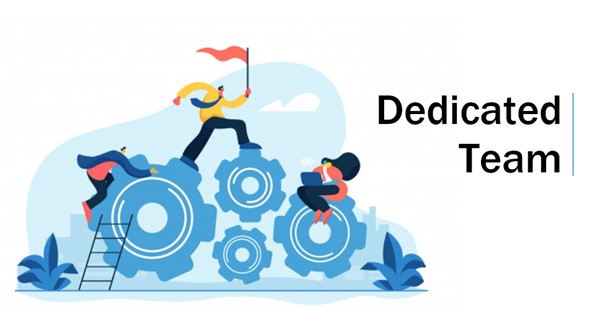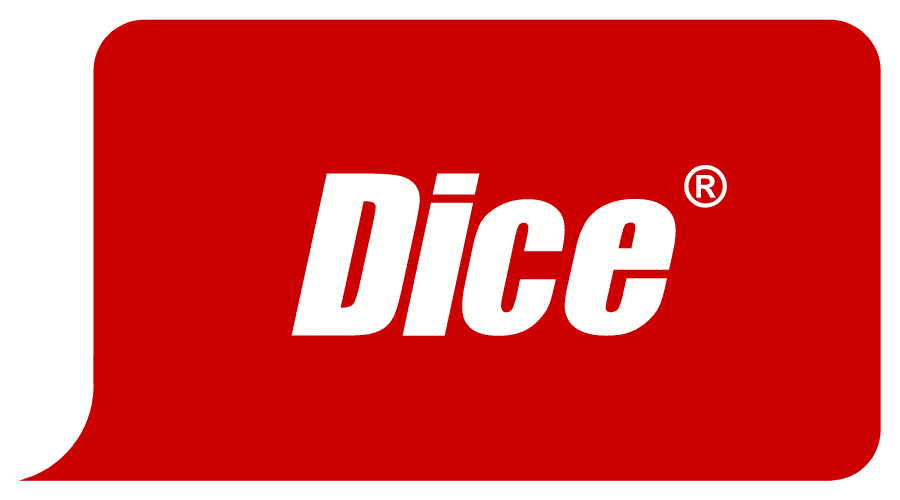A dedicated development team is a popular partnership model in software development for remote client collaboration. This model is the best choice for both established businesses and growing startups because it is transparent and effective.

This article explains what a dedicated development team model is, its benefits and drawbacks, and how it differs from fixed-price and time-and-material frameworks.
It will also discuss how the dedicated team model works and how the Uptech team employs it to provide the best experience possible.
{autotoc}
What Is A Dedicated Development Team Model?
A dedicated development team is a long-term collaboration model with an outsourced development team in which a client and a developer's team collaborate.
This is a popular collaboration mode that is comparable to the fixed price (FP) and time and material (T&M) models.
If you choose to work with a dedicated development team, you will be working with a group of professionals who have been hand-picked to meet your company's objectives.
This group is similar to an in-house team, except that they are technically your employees.
With a dedicated team, you don't have to worry about administrative, HR, tax, or social benefits issues, unlike with employees.
Instead, you can concentrate on higher-level business issues while your development partners take care of the rest.
To summarise, a dedicated team model provides you with a hand-picked professional team that is solely responsible for completing a single project.
Furthermore, they are responsible for all administrative costs.

Top 7 Sites to Hire Developers
Before we start describing each site in detail, check out this quick summary on where to hire a dedicated development team.
| Rank | Site | Price Range | Quality Rating | What we liked | What we didn't like |
|---|---|---|---|---|---|
| 1 | High | 5/5 | Top-quality developers | Not affordable for everybody | |
| 2 | Low to Medium | 4.5/5 | No intermediaries, direct to app developer | Significant variance in prices for app development | |
| 3 | Medium | 5/5 | Candidates in less than 48 hours | Permanent basis hires only | |
| 4 | Medium to High | 4/5 | Very experienced app developers | Few candidataes in certain niches | |
| 5 | Low to High | 4/5 | Available in over 60 countries | Access to resumes requires monthly subscription | |
| 6 | Low to High | 3.5/5 | Jobs promoted to 3000 partners for 30 days | United States Only, some regions under represented | |
| 7 | Low to High | 4.5/5 | Vetted expert development teams | No freelancers |
What Is The Cost Of Hiring A Dedicated Development Team?
According to Deloitte's 2020 Global Outsourcing Survey, the top reason to outsource (70 percent) is to save money. Hiring a dedicated team can also help you save money, and here's how.
In a dedicated team, the pricing model is straightforward. You pay for the number of hours worked since you hired a team, and each employee has a specific hourly rate.
This is the only thing you have to pay for. There are no additional costs for renting an office for a team, purchasing equipment, paying taxes, or paying electricity bills, for example.
Furthermore, hiring a dedicated software development team is much less expensive and time-consuming than searching for each professional individually with an HR team.
Who Is In A Dedicated Team?
The composition of your team is determined by your company's needs. As a result, your development team could include:
- Front-end and back-end developers, full-stack engineers, and mobile developers are all needed
- UI (User Interface) and UX (User Experience) Designers
- Devops Engineers
- QA (Quality Assurance) Specialists
- Business Analysts
- Product Managers
- Project Managers
Dedicated Development Team Vs Fixed Price Model
The dedicated team model is frequently confused with the fixed price format. These two forms, however, cater to very different business requirements.
The fixed-price collaboration model is a framework in which a client pays a set fee regardless of the number of hours worked or the job completed. This mode is best for short-term projects with specific requirements and scope of work.
The main flaw in the fixed-price model is the possibility of overpaying. It's not always possible to predict the length and scope of work ahead of time.
In any case, even if the job hasn't been completed, you'll have to pay the agreed-upon amount under the fixed-price contract.
The fixed-price model will work in the following situations:
- Projects with definite completion dates
- Specification that has been determined
- Projects with a short timeline
- When no changes are expected
- The creation of an MVP
Unlike fixed-price models, the dedicated team format allows you to have as much freedom and development space as you need without paying too much.
Dedicated Development Team Vs Time and Material Model
The Time and Material format is another format that usually competes with the dedicated team.
- The Time and Material model charges a client for the team's actual time and effort spent developing a specific feature.
- As a result, this collaboration model is appropriate for.
- Projects with a high degree of flexibility in terms of requirements.
- The market hasn't been thoroughly investigated.
- The product-market fit hasn't been determined yet.
While the Time and Material model allows for in-depth research and development, it does not ensure that you will work with the same team throughout the project. If there aren't enough tasks on your project for some specialists, they can be assigned to another project.
Meanwhile, the benefit of a dedicated team model is its commitment. You can rest assured that your project will be handled by an entirely dedicated team that is not obligated to take on other projects. This is what distinguishes a "dedicated" team.

3 Signs That You Should Hire a Dedicated Team
The dedicated team model is ideal for complex, long-term projects that have the potential to grow. The dedicated development team is the way to go when your idea doesn't have a product-market fit and requires a discovery stage.
Startups in their Early Stages
If you're a startup in its early stages, you're expected to grow. In this case, enlisting the help of a dedicated team can be a wise decision.
This method will allow you to quickly assemble a team, save money on hiring processes, and develop the product more quickly. The augmented team handles the extra work while your in-house team concentrates on business-related tasks.
Projects with a Wide Range of Requirements
The dedicated team is the way to go when your idea doesn't have product-market fit and requires a discovery stage. Because the discovery stage establishes the foundation for the project's entire development mechanism, it may take months of testing and interviews to finally settle down.
The dedicated team model gives you the time and resources you need to focus on the discovery stage without worrying about going over budget.
Projects that will last a long time
The dedicated team model is best suited to complex, long-term projects with growth potential. You'll need a strong team of developers to help you realise the full potential of your project.
Within a dedicated team, you can be confident that the people you begin working with will see the project through to completion.
Let's also take a look at some of the biggest tech companies, such as WhatsApp. They hired a dedicated team of iOS app developers to assist them. Apple, Oracle, American Express, IBM, Verizon, Amazon, Doist, Automatic, Buffer, and 10up are among the companies that use the dedicated team approach.
Reasons Why You Shouldn't Use a Dedicated Team Model
The dedicated team model, despite its obvious benefits, is not a one-size-fits-all solution. The dedicated development team collaboration model is not the best option in the following situations:
Projects With a Short and Mid-Term Goal
For small projects with clearly defined requirements, you don't need a dedicated and involved team. When the work scope is clearly defined, you'll need a team to complete the tasks. A fixed price model is ideal for short-term projects in this case, while the Time&Material approach is appropriate for medium-term businesses.
Time And Money Are Limited
When you have a strict budget for a project, a dedicated team model is not the best option. You don't always need a full-time designer or project manager. In this case, a fixed-price model is more than adequate to achieve the desired outcome.
How Does Dedicated Team Collaboration Work?
The following is how a company typically begins a new dedicated team project:
Scope estimation
This determines how much work needs to be done and how many people will be involved during this phase.
A business analyst does this by communicating with a client to determine his or her needs and desires. Business analysts use this information to define the project's requirements and determine its scope.
In determining the scope, there are two possibilities:
- The client has a set of requirements. They talk about the budget with the client, taking into account their priorities and expected or given timelines.
- The client has no idea what the scope is. They conduct a discovery stage in which we generate hypotheses and test them using prototypes.
They examine whether the current scope reflects our objectives based on the test results.
Selection of talent
They assemble a team of skilled and motivated professionals to work on your project at this point. The following are the selection criteria we use:
- Profitability - the project's expected return on investment.
- Uptech's team has the skills and experience to deliver high-quality products and services.
- Skills Development - the chance for a team member to improve their skills while working on the project.
- Morale and motivation are the psychological prerequisites for success on this project.
- Call for a scope call. On this call, they talk about the client's first sprint's goals, milestones, and priorities.
- Proposal call, in which they present a proposed solution, expected team composition, timelines, budget, and, if necessary, additional research activities.
The game is about to begin.
This is the point at which the team is given the go-ahead to begin working together. The purpose of the call is to meet the team (client team and the company), talk about who will do what, get access to the development tools, align project and business priorities, and schedule check-ins.
Conclusion
To summarise, a dedicated team is the best option for projects with a lot of moving parts, such as aspiring startups and growing tech companies. In terms of optimal cost and selected professionals on the team, dedicated partnerships are the best fit for such enterprises seeking long-term collaboration. With this in mind, you can decide whether or not you require a dedicated team.
However, if you are still unsure about which type of collaboration model will work best for you, please contact us. We will take the approach that best suits your needs.
Dedicated Development Team FAQs
What Does a Dedicated Team Mean?
A dedicated team is a model for a long-term partnership between a client and the development team. A team of developers is dedicated to a client's project in this format, with the assurance that no team member will be switched to another project. This is what "dedicated" means.
What is the role of a development team?
The development team determines product-market fit, creates UX and UI design, writes code, and oversees quality assurance and product maintenance. Essentially, they are creating the actual product, platform or app that is being sold.
What Is The Best Way To Structure A Development Team?
A typical software development team is made up of specialists with a diverse set of skills and experience: Project and Product Managers, Business Analysts, Designers, Developers, Quality Assurance Testers and potentially DevOps engineers.






